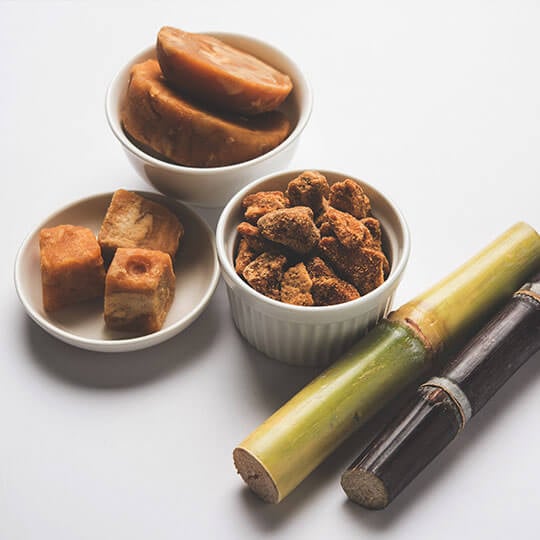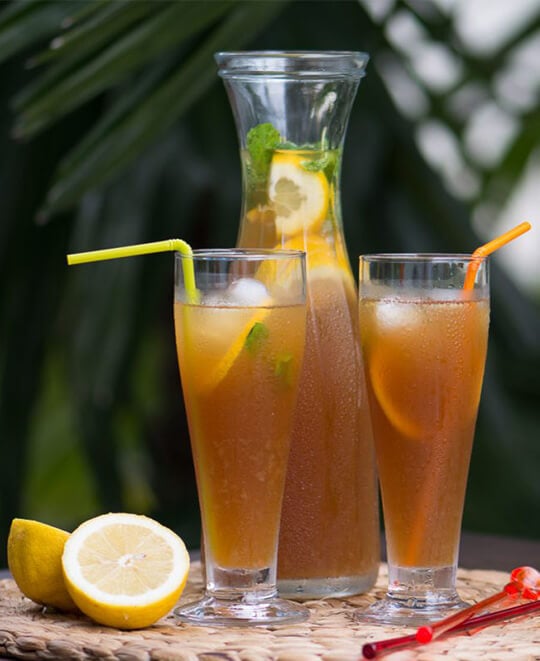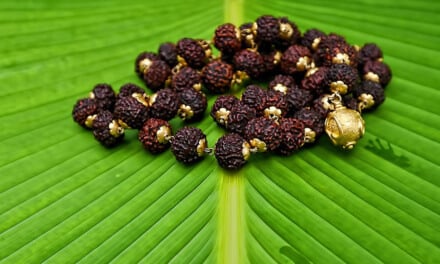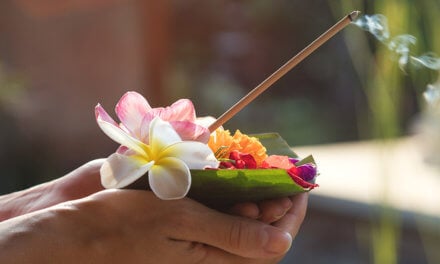
Yogi Superfoods 101:
Jaggery
The Ancient Ayurvedic Sugar Substitute You Can Use to Boost Your B-12
Awesome Ayurveda | Beginner
By: Haylee Magendans
Did you know …
100’s of Millions of Vegetarians in India Don’t Take Vitamin B-12 Supplements!?
In fact, boosting your B-12 can be safe and natural. You don’t need to eat animal products or even take supplements to maintain your vital energy! Many vegans and vegetarians alike rely on the ancient Ayurvedic superfood Jaggery as a primary source of vitamin B-12. Jaggery is wildly popular in India; yet its amazing health benefits and medicinal properties are not common knowledge in the western world.
What is Jaggery?
Jaggery is a natural sweetener found all over India and other parts of Asia, and is commonly obtained from raw, concentrated sugar cane juice, the sap from palm trees or sometimes from dates. It is prepared by boiling the juice or sap until it has reduced and solidified. Typically, it is unrefined, which ensures that it maintains all of its natural properties and health benefits. The older the jaggery, the more medicinal it is (darker, older jaggery has more medicinal properties than younger, lighter jaggery).
Yet, while all types of Jaggery have numerous health benefits, it is Palm Jaggery that is the most prized for its vitamin B-12 content.
Nutritional Info
100 grams of Jaggery
- Calcium 22%
- Iron 32%
- Sugars 85%
* Percent Daily Values are based on a 2000 calorie diet.

The Incredible Benefits of Jaggery
Jaggery prevents and alleviates conditions such as:
Anaemia, food poisoning, stroke, infection, weight gain, ulcers, indigestion, as well as joint and muscle pain. It also activates the 108 centers in the brain, helps to control cholesterol and blood pressure, regulate the lungs, and cools the body.
The many health benefits of Jaggery include:
Purification of the blood, balanced brain chemistry, calming the mind, stable emotions/moods, stronger bones (good for osteoporosis), stronger muscles, prevention of disease, increased digestion and regulation of the digestive system, sustained energy (Shakti), stabilized blood-sugar levels, regulation of the intestines, stronger immune system, radiant skin, smooth and silky hair, and prevention of hair loss.
Jaggery Also Contains:
Iron, Magnesium, Potassium, Calcium, Phosphorus and is loaded with many different vitamins and minerals.
Where Does Palm Jaggery Come From?
Palm Jaggery is similar to a Jaggery made from sugarcane juice, but is instead made from the sap extract of Palm Trees. This Jaggery has a rich earthy taste reminiscent of chocolate and is processed from the unfermented Palmyra Tree sap, also known as Neera.
While the Northern states of India prefer sugarcane Jaggery (still far superior to processed cane sugar), Palmyra Jaggery is most popular in the southern states like Tamil Nadu, Karnataka, Kerala and Andhra Pradesh where it is used in all kinds of sweet dishes and also in temples for prasadam (food used as offerings to the Gods and consumed after ritual ceremony).
Jaggery has been used in India for centuries as a nutrient-rich sweetener and unlike white sugar, which is often processed with chemicals and devoid of nutrients; Jaggery, on the other hand, is processed without any chemicals or artificial ingredients. As such, it is rich in vitamins and minerals.
Palm Jaggery & Ayurveda
Palm Jaggery is known to activate the digestive enzymes, and is thus used as a digestive after heavy meals in many parts of India. Moreover, its high fiber content helps to cleanse the digestive tract. It is also used in ayurvedic healing for treating constipation, menstrual cramps, respiratory disorders, and anemia. It is also considered a relaxant and is often given to new lactating mothers (human & cow) to provide calcium and essential vitamins & minerals post birth.
When it comes to sugar alternatives, Palmyra Jaggery is unparalleled as it has 24 nutrients including Vitamin B12, other B vitamins, Iron, Potassium & Magnesium, among others. It is something Indians have been using in a vegetarian diet for centuries without the need for B-12 supplements.
Amazingly, organic Palmyra Jaggery, or Indian Palmyra / Indian Palm Sugar, happens to be of the few, very rare, plant-based sources of vitamin B-12 in the world.
Here’s What You Should Know About Vitamin B-12 …
Vitamin B12 is essential to human health. It is responsible for helping to make DNA and for keeping the bodies nerve and blood cells healthy. Side effects of a vitamin B12 deficiency can be very serious. It is the one vitamin that vegans and vegetarians struggle to get from food alone. Many know that Vitamin B12 is found in animal products such as fish, meat, poultry, eggs, milk and other dairy products, and is not commonly present in plant foods. As a result, B12 deficiency affects vegans more so than vegetarians, as vegetarians may get sufficient quantities of B12 though milk and egg products.
The Real Source of B-12
Did you know that it is actually bacteria that produce Vitamin B12?
This means all animals, humans included, must obtain B12 directly or indirectly from bacteria. Contrary to popular belief, it is not produced by animals and therefore, it does not mean it is necessary to eat animal products in order to consume it.
The bacteria that produce B12 can be found in organic soil, manure, natural water sources and in the intestinal tracts of grazing animals and at times, in that of humans. Animals naturally acquire it from the ground as they graze. By ingesting small amounts of soil that contains vitamin B12, they actually accumulate this bacteria throughout their lives, resulting in their bodies containing high levels of the vitamin. However, modern farming practices are so far removed from nature, that the animals, in fact, don’t take in B12 from grazing. Instead, their animal feed is often supplemented with vitamin B12 in order to keep them healthy, similarly to humans, as they also need it to function properly.
Mainstream information leads us to believe that we need animal products for vitamin B12, but this not the case.
In the past when we lived a more natural life and ate foods straight from the ground without using chemicals to wash them, vitamin B12 was more reliably present in plant foods, because we consumed it by eating roots and plants that were free of soaps, sprays and chemicals. However, because we now heavily clean and sanitize our produce, as well as expose our soils to antibiotics and pesticides, most plant foods are ‘sterile’ and can no longer be considered a reliable source of this bacterial product.
How to boost your b-12 naturally
Some of the best natural sources of Vitamin B12 are Palmyra Jaggery, certain seaweeds & algae and nutritional yeast. Fortified foods such as alternative milks (almond, rice, soy etc.), breakfast cereals and alternative meat substitutes are also considered to be good sources of B-12 – yet they are not 100% natural.
Still, many yogis and vegetarians in India rely on jaggery as their primary source of B12 due to its incredible health benefits. Jaggery is very affordable and can be easily found and purchased online through many different health food suppliers. It can also be found in small Indian grocery shops, which are quite common in larger cities throughout the world.
How You Can Use Jaggery At Home
Jaggery can be used in both sweet and savoury dishes. And although there are a wealth of recipes and ways to include more Jaggery in your diet, here is a simple Ayurvedic home remedy you can use to derive all its benefits and increase your B-12:
Servings
1
Prep Time:
3 mins
Cooking time:
n/a
Good For:
Anytime of Day
Jaggery Juice
- 100 Grams Jaggery
- 1 Glass of Water
- Pinch of Salt
- Pinch of Pepper
- 1 tsp. Lemon Juice
- Pinch of Cardamom Powder (optional)
- Mint Leaves to Garnish (optional)

Step by Step Instructions
Step 1
Shave about 100 grams of jaggery from your jaggery clump with a sharp knife
Step 2
Thinly slice the jaggery shaving into a loose powder
Step 3
Add the jaggery to 1 glass of water and stir until it has dissolved. You may need to heat your water slightly to help dissolve the jaggery.
Step 4
Add a pinch of salt and pepper to taste
Step 5
Add 1 tsp of lemon juice
Step 6
Add a pinch of cardamom (optional) and stir
Step 7
Garnish with mint leaves and serve
Ayurvedic Breakdown
Jaggery is traditionally made fresh and allowed to age, whereby it naturally ferments and changes in taste and color over time. As a general rule, aged Jaggery is more recommended and considered as beneficial to all 3 doshas in moderation.
JAggery Juice
Vata is balanced by Jaggery, so it is highly recommended for long periods of time.
Pitta is slightly aggravated by Jaggery, so the amount of jaggery should be halved (50 grams) and instead of water it can be mixed with almond milk.
Only aged Jaggery is recommended for Kapha, and in moderation. Jaggery is considered “aged” after about 1 year and will have turned a deeper brown color compared to the freshly prepared jaggery. Reduce the quantity of jaggery to 50 grams if you begin to drink this regularily.
























